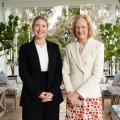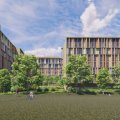Leading neuroscientists from Australia, China, and the USA will visit The University of Queensland this week to join Queensland Brain Institute neuroscientists in a three day symposium.
They will attend the 2008 Brain Plasticity Symposium (September 9-12) to explore the fundamental processes that regulate brain function and diseases.
Understanding the workings of the brain is considered to be the last great frontier in biological science.
The neuroscientists from around the world will present their latest findings. Their results are widely expected to lead eventually to improved treatments for a broad spectrum of nervous system disorders, which accounts for almost 50 percent of the burden of disease in our community.
Director of the QBI Professor Perry Bartlett FAA said the symposium was being held at an "exciting time for neuroscience".
"Our understanding of brain function in both health and disease is growing at a very fast rate and possible cures for conditions such as age-related dementia can be envisaged in the not too distant future," he said.
"This symposium provides a unique opportunity to hear world-leading neuroscientists discuss their latest research into the mechanisms that underlie learning and memory as well as disease states."
The Brain Plasticity symposium is hosted by the QBI and will showcase state-of-the-art research facilities at UQ to the international community.
Established in 2003, the QBI is dedicated to understanding the cellular and molecular basis of brain function and applying this knowledge to the development of new therapeutics to treat brain disorders. Laboratories within the QBI study brain function at all levels from molecules and cells in insects to learning in humans.
Among the overseas speakers at the Symposium are:
• Dr Robert Malenka, who is Pritzker Professor of Psychiatry & Behavioral Sciences and Director of the Nancy Friend Pritzker Laboratory at Stanford University School of Medicine. He is a works expert on how cells in the brain communicate with each other and how their properties change during learning and memory formation and during disorders such as drug addiction.
• Dr Tom Sudhof, who is Professor of Molecular Genetics Investigator at the Center for Basic Neuroscience at the Southwestern Medical centre at the University of Texas. He is an expert on the molecular mechanisms involved in communication between brain cells. He is the discoverer of many proteins that are involved in communication between neurons.
• Dr John Kessler, who is Benjamin Boshes Professor at the Department of Neurology, Northwestern University, Chicago. He is a world expert in how stem cells make new cells in the adult brain and how they can be modulated to work to help cure some neural disease states.
• Professor Ai-ke Guo, who is professor at the Institute of Neuroscience in Shanghai. He studies learning and memory in small brains in fruit flies. He is a world expert in memory formation and decision making in small nervous systems.
Media: Jan King 0413 601 248




